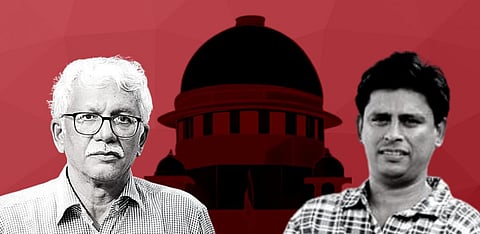

The Bench directed the National Investigation Agency (NIA)'s special court to set such conditions as necessary, including requiring the two to not change their mobile phones, keep them active and charged at all times, keep the location status of the mobile phones 'active' all through the day, and pair the devices with the devices of the investigating office of the NIA.
—
ON Friday, the Supreme Court granted regular bail to trade unionist, activist and academic Vernon Gonsalves, and activist and lawyer Arun Ferreira.
Gonsalves and Ferreira are accused in the Bhima Koregaon–Elgar Parishad case and charged under the Unlawful Activities (Prevention) Act, 1967 (UAPA).
The duo had filed bail applications at the Supreme Court challenging the Order of the Bombay High Court dated October 15, 2019, rejecting their bail pleas.
A division Bench of the Supreme Court, comprising Justices Aniruddha Bose and Sudhanshu Dhulia, had reserved its judgment on the bail applications on March 4.
The Bench also observed that the materials eluded to as part of incriminating evidence against the accused persons cannot justify their continued custody.
The Bench directed the National Investigation Agency (NIA)'s special court to set such conditions as necessary, including requiring the two to seek permission before leaving Maharashtra, surrendering their passports and keeping the NIA informed about changes in their residential addresses.
The Bench also permitted the NIA special court to require of the duo not to change their mobile phones, keep them active and charged at all times, keep the location status of the mobile phones 'active' all through the day, and pair the devices with the devices of the investigating office of the NIA.
The two accused can also be required to report to the station house officer of the police station within the appropriate jurisdiction once a week.
In the event of breach of such conditions or threatening and influencing of witnesses, the prosecution was granted liberty to seek cancellation of their bail by making such application before the trial court.
Background
Gonsalves and Ferreira were among the five activists arrested on August 28, 2018, for allegedly being affiliated with banned Maoist organisations, and provoking violence at Koregaon Bhima village in Maharashtra on January 1, 2018.
In October 2019, the Bombay High Court dismissed their bail applications.
In view of the revelations related to the use of the Pegasus spyware in India that came out in 2021, Gonsalves, along with some other accused persons in the case, requested a Supreme Court-appointed technical committee to direct the NIA to hand over his phone for inquiry to the committee to check for infection by a malware.
On August 22, 2022, a special NIA court rejected an application filed by Ferreira that sought direction for the prosecution to provide a copy of the formal order of interception by which his emails were intercepted by the NIA. Ferreira argued that the interception of his emails, as retrieved by the NIA within an hour of being sent and used as electronic evidence, is illegal.
The prosecution in the case has filed a chargesheet exceeding 5,000 pages and intends to cross-examine at least 200 witnesses.
Ten of the 16 accused persons are presently incarcerated, having now spent between two to almost five years in judicial custody without trial.
In addition to Gonsalves and Ferreira, three of the other accused persons, Sudha Bharadwaj, Varavara Rao and Anand Teltumbde have also managed to secure bail so far.
Another accused, tribal rights activist and Jesuit priest Father Stan Swamy, passed away in judicial custody in July 2021 after contracting Covid in prison while awaiting bail on medical grounds.
An investigation by Arsenal Consulting, a leading, independent expert firm on digital forensics, has revealed that sophisticated malware was used to plant the digital evidence that forms the basis for the prosecution's case on the devices of two of the accused persons in the case, Surendra Gadling and Rona Wilson.
Click here to read the judgment.